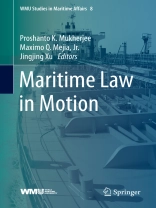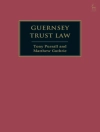This book provides valuable insights into various contemporary issues in public and private maritime law, including interdisciplinary aspects. The public law topics addressed include public international law and law of the sea, while a variety of private law topics are explored, e.g. commercial maritime law, conflict of laws, and new developments in the application of advanced technologies to maritime law issues. In addition, the book highlights current and topical discussions at international maritime forums such as the International Maritime Organization on regulatory and private law matters within the domain of marine environmental law, the law respecting seafarers’ affairs and maritime pedagogics, maritime security, comparative law in the maritime field, trade law, recent case law analysis, taxation law in the maritime context, maritime arbitration, carriage of passengers, port law, and limitation of liability.
Table of Content
The Effect of the Arbitration Clause Incorporated in a Bill of Lading to Third Persons.- Regime Interaction and GAIRS.- Maritime Rules for Rail Carriage: China’s Initiative to Incorporate Rules from the Road to the Belt.- A Critical Analysis of Carriage of Passengers by Sea: Uniformity Through International and Regional Approaches.- Occupational Hazards in the Light of the Maritime Migration Challenge.- Governance of International Shipping in the Era of Decarbonisation: New Challenges for the IMO?.- Good Faith in Maritime Law Contracts.- Legal Aspects of Green Shipping Finance: Insights from the European Investment Bank’s Schemes.- When Was the Last Time You Were Restrained by a Prince? Conservatism and the Development of Maritime Law.- Private Maritime Security Companies Within the International Legal Framework for Maritime Security.- Compensation for Cargo Damage in International Maritime Transportation: Chinese Law Perspective.- Innocent Passage Under UNCLOS: An Exploration of the Tenets, Trials, and Tribulations.- What Challenges Lie Ahead for Maritime Law?.- Sanctions Compliance Risks in International Shipping: Closure of Five Crimean Ports, the Sanctions Regime in Respect of Ukraine/Russia and Related Compliance Challenges.- Shipowner’s Implied Obligations in a Charterparty Relating to Lien on Cargo: English and Chinese Law Perspectives.- An Exposé of Canadian “Abandoned Vessels & Derelicts” Through a Legal Analysis of Doctrinal Silos.- Korean Collision Avoidance Rules and Apportionment of Liability.- The Application of Human Rights and Ethics Principles to Self-protection Measures by the Ship Against Pirates and Armed Robbers.- Blockchain and Bills of Lading: Legal Issues in Perspective.- Environmental Challenge in Port Development: The Legal Perspective in Cross-Disciplinary Research.- Taxation and Ship Management: A Canadian Case Study.- The Evolution of Seafarer Education and Training in International Law.- Coastal, Flag and Port State Jurisdictions: Powers and Other Considerations Under UNCLOS.- Air Pollution, Climate Change, and Port State Control.- A Century of Piracy Treaties: An Overview for the Future.- Windfall in the Law of Subrogation: Marine Insurance in Motion.- Ship Nationality, Flag States and the Eradication of Substandard Ships: A Critical Analysis.- Pedagogies and Strategies in International Maritime Business.- Cyber Risks Insurance in the Maritime Sector: Growing Pains and Legal Problems.- The Legal Concept and Significance of Clean Shipping Transport Documents.- Liability Insurer’s Right to Limit Liability for Maritime Claims: English and Chinese Law Perspectives.- Shipowner Protection in the Wake of the Collapse of O.W. Bunker: The Second Circuit Approval of Interpleader Actions in Hapag-Lloyd Aktiengesellschaft v. U.S. Oil Trading LLC.- The International Legal Regime Governing Shipboard LNG.- Intelligent Ships.- The United Kingdom Tonnage Tax Regime: Compatibility with Relevant European Union Tax Law and Policy.- Advisory Jurisdiction of the International Tribunal for the Law of the Sea as a Full Court: Legal Basis and Limits.- Lex Maritima in a Changing World: Development and Prospect of Rules Governing Carriage of Goods by Sea.
About the author
Proshanto K. Mukherjee is the former Vice President Research, Director of Doctoral Programmes and ITF Professor of Maritime Safety and Environmental Protection at WMU. He served as Co-Director of the WMU/Lund University joint LL.M. programme. He is an Honorary Research Fellow of Swansea University (SU); Professor of Law at Dalian Maritime University, China; Visiting Professor at the Graduate School of Human Resource Development of Chung-Ang University, South Korea; Visiting Professor at National University of Juridical Sciences, Kolkata, India, and is Chancellor of CINEC Maritime Campus, Colombo, Sri Lanka. He has been doctoral supervisor and examiner for several Ph.D. candidates around the world.
Professor Max Mejia is Director of the Ph D Program and Head of the Maritime Law and Policy Specialization at the World Maritime University (WMU), where he has been a member of the resident faculty since 1998. Before joining WMU, he saw duty on board various naval and coast guard vessels as well as in shore-based facilities in the Philippines. His assignments included, inter alia, Commanding Officer of Port State Control Office Manila, Commander of Coast Guard Station Iligan, Deputy Executive Director of the Presidential Task Force on Maritime Development, and Assistant Chief of Staff for Navigational Safety. He earned his Bachelor of Science at the United States Naval Academy (Annapolis, Maryland, USA) and his Master of Arts in Law and Diplomacy at the Fletcher School (Tufts University, Massachusetts, USA). He also has a Master of Science in Maritime Safety Administration from the World Maritime University (Malmö, Sweden) and a Licentiate of Engineering and Doctor of Philosophy from Lund University (Lund, Sweden). His Ph D thesis is entitled “Law and Ergonomics in Maritime Security.”
Professor Jingjing Xu is Head of School, Plymouth Business School and Professor of Maritime Law and Economics.












